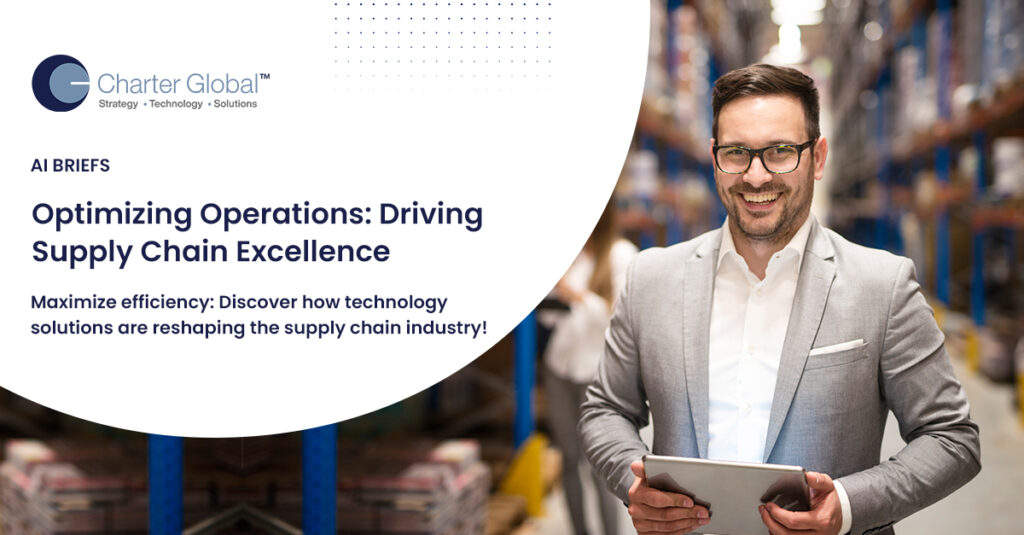AI is becoming increasingly indispensable within the supply chain section and encouraging professionals to embrace AI technologies to enhance efficiency and gain a competitive edge. Failure to do so risks falling behind competitors who leverage AI-driven solutions to streamline operations, reduce costs and improve customer satisfaction. By utilizing AI algorithms for demand forecasting, inventory management and route optimization, companies can optimize their supply chain processes, minimize waste and respond swiftly to market fluctuations. AI-powered predictive analytics enable proactive risk management, allowing organizations to anticipate and mitigate disruptions before they escalate. In essence, integrating AI into supply chain management empowers businesses to adapt to dynamic market conditions and deliver exceptional value to stakeholders.
As part of our AI insights series, we’ll delve into the pivotal role AI plays in reshaping the Supply Chain, exploring vast potential, current applications and benefits it can provide. Moreover, we’ll navigate through the challenges and considerations in adopting AI, offering strategies for successful implementation.

The supply chain industry serves as the backbone of global commerce, facilitating the movement of goods from manufacturers to consumers. However, this complex network faces numerous challenges, including demand volatility, inventory management inefficiencies and logistics complexities. Enter AI, which is poised to revolutionize operations and drive competitive advantage in the supply chain arena. By leveraging the power of AI, businesses can optimize processes, mitigate risks, and enhance agility to meet evolving customer demands.
AI offers a wealth of opportunities to streamline supply chain operations and address longstanding pain points. AI in Supply Chain Management allows for capturing, managing and deciphering vast amounts of data spanning the entire supply chain spectrum. Integrated with blockchain technology and interconnected enterprise systems, AI facilitates real-time monitoring and traceability of products, fostering transparency and thwarting fraudulent activities.
AI use cases include demand forecasting, route optimization and inventory optimization. This enables businesses to predict demand more accurately, optimize transportation routes for cost savings and maintain optimal inventory levels to minimize stockouts and excess inventory costs. Real-world success stories abound, with companies leveraging AI to achieve remarkable efficiency gains and competitive differentiation.
There are many benefits of integrating AI into supply chain operations. Some examples include:
These are only a few of the opportunities and efficiencies the supply chain can pursue.
Implementing AI in the supply chain entails overcoming various challenges. Data silos and legacy systems hinder the seamless flow of information and compatibility with advanced technologies, while organizational resistance to change complicates adoption. Addressing these hurdles requires proactive strategies such as breaking down data silos through integration initiatives, providing comprehensive employee training to foster a culture of innovation, and conducting pilot projects to assess feasibility and build confidence.
Investing in unified data ecosystems, comprehensive training and pilot projects can maximize AI success for businesses, enabling informed decisions, skilled employees, and tangible benefits, especially in the supply chain, leveraging the power to bring about tangible change.
AI offers tremendous potential for supply chain operations, offering unprecedented opportunities to optimize financial processes, enhance customer experiences, and provide personalized support to clients. Whether a boutique investment firm or a multinational bank, embracing AI can position your institution for success in an ever-evolving financial landscape.
At Charter Global, our team of experts is here to help you leverage the power of AI and drive sustainable growth in your supply chain. AI can revolutionize supply chain operations by enhancing customer satisfaction, minimizing costs, streamlining processes, and ultimately gaining a competitive edge. If you’re interested in discovering how AI can revolutionize your financial institution, Contact Us today.